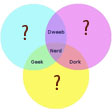 I wrote yesterday about the potential for the Internet to become fragmented and subdivided so that it would be many separate internets rather than a vehicle for open international communication. Traditionally this kind of subdivision is called balkanization, though I called it cantonization because of the current example of the great Chinese firewall [China’s Golden Shield]. What you see as the Internet when you log on in many countries around the world is only a portion of what you’ll see from other locations. There are some other important issues related to this fragmentation of the net. [Read more…]
I wrote yesterday about the potential for the Internet to become fragmented and subdivided so that it would be many separate internets rather than a vehicle for open international communication. Traditionally this kind of subdivision is called balkanization, though I called it cantonization because of the current example of the great Chinese firewall [China’s Golden Shield]. What you see as the Internet when you log on in many countries around the world is only a portion of what you’ll see from other locations. There are some other important issues related to this fragmentation of the net. [Read more…]
Google Chinese-language search, Hong Kong, and Internet Cantonization
 So the “solution” to providing uncensored Chinese-language search, at least right now (beginning 22 March, 2010), is to have Chinese citizens use google.com.hk (hk==Hong Kong) rather than mainland-based google.cn. I guess it’s a breakthrough idea to do this, since under Hong Kong law, the uncensored search is legal, but of course the arguments going on these days about restrictive access to the Internet have to do with nations trying to restrict the access of their citizens based on physical location. And the location of a server is important because the local authorities can come in and physically shut you down.
So the “solution” to providing uncensored Chinese-language search, at least right now (beginning 22 March, 2010), is to have Chinese citizens use google.com.hk (hk==Hong Kong) rather than mainland-based google.cn. I guess it’s a breakthrough idea to do this, since under Hong Kong law, the uncensored search is legal, but of course the arguments going on these days about restrictive access to the Internet have to do with nations trying to restrict the access of their citizens based on physical location. And the location of a server is important because the local authorities can come in and physically shut you down.
But the great firewall is already blocking Google.com.hk content, as would be expected. [Read more…]
Differentiating “geeks” from… whatever
 Have you ever noticed that sometimes when you are described as a geek it’s not exactly a compliment? (I always mean it as a compliment, comeon!) That’s because people don’t fully understand the words nerd, dork, dweeb and geek. Here’s the explanation as a cool Venn diagram.
Have you ever noticed that sometimes when you are described as a geek it’s not exactly a compliment? (I always mean it as a compliment, comeon!) That’s because people don’t fully understand the words nerd, dork, dweeb and geek. Here’s the explanation as a cool Venn diagram.
Thanks to Xeni at BoingBoing for pointing it out. And click the diagram to see how the terms relate.
Also see Traveling Geeks. Not Traveling Dweebs, Traveling Nerds or Traveling Dorks.
And here’s an interesting bestiary of geekdom, listing many different types of geeks. I know a few who fall into some, but not all, of the categories.
The Future of Publishing – by DK
 Here’s a novel way of looking at how we (maybe) fit into the future of publishing—Dorling Kindersley Books did a video about The Future of Publishing, initially for internal consumption, but later on they released it on YouTube. As Cory Doctorow said when blogging it in BoingBoing.net[1] “Watch it at least halfway through…” and you’ll see a change in attitude. [Read more…]
Here’s a novel way of looking at how we (maybe) fit into the future of publishing—Dorling Kindersley Books did a video about The Future of Publishing, initially for internal consumption, but later on they released it on YouTube. As Cory Doctorow said when blogging it in BoingBoing.net[1] “Watch it at least halfway through…” and you’ll see a change in attitude. [Read more…]
Google and China – something will happen soon
 On March 10 (2009) Eric Schmidt, CEO of Google, was quoted in the Wall Street Journal as saying “something will happen soon” with respect to their presence in China. China today warned that Google must operate within their laws.
On March 10 (2009) Eric Schmidt, CEO of Google, was quoted in the Wall Street Journal as saying “something will happen soon” with respect to their presence in China. China today warned that Google must operate within their laws.
—the U.S. Internet company “will have to bear the consequences” if it follows through on its pledge to stop censoring its Chinese search site. [WSJ article]
Why is it that we in the “West” hear this statement so differently from the Chinese?
—You are free to say anything you want (in China) as long as it’s legal. [Sky paraphrases what they’ve said]
To give you a benchmark, in China it is illegal to have a photo of the Dalai Lama because he is called a subversive (splittist). In Costa Rica it has been illegal to propose changing the constitution. In the US (and many other countries) it is legal to propose changing the constitution, but illegal to attempt to change it by force or violence. In other words, in some countries it’s illegal to even talk about certain kinds of change…and therefore real and full free speech is impossible. There’s always a limit—it’s just quite variable and we have to work to make or keep it reasonable.
- « Previous Page
- 1
- …
- 27
- 28
- 29
- 30
- 31
- …
- 90
- Next Page »